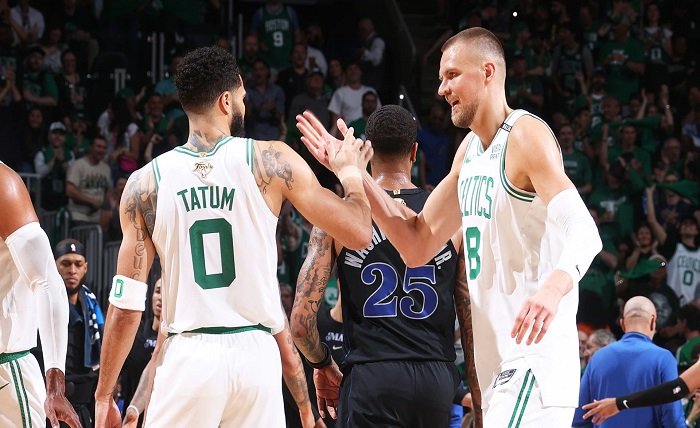
Introduction
The Dallas Mavericks vs. Boston Celtics match is always an exciting showdown, bringing intense competition and impressive displays of skill. Player stats from this match reveal key insights into performance, teamwork, and strategies used by both teams. Analyzing the Dallas Mavericks vs. Boston Celtics match player stats gives us a closer look at the standout performances and critical plays that influenced the game’s outcome.
Key Players to Watch in the Dallas Mavericks vs. Boston Celtics Match
When looking at the Dallas Mavericks vs. Boston Celtics match player stats, certain players consistently stand out. For the Mavericks, Luka Dončić’s offensive and playmaking skills make him one to watch. Meanwhile, Jayson Tatum’s scoring and defense have made him a crucial figure for the Celtics. Tracking these players’ stats is essential for understanding how each contributed to their team’s performance.
Scoring Analysis: Dallas Mavericks vs. Boston Celtics
Scoring is a major focus in analyzing Dallas Mavericks vs. Boston Celtics match player stats. High scorers on both teams showcased remarkable skill and precision. For the Mavericks, Luka Dončić and Kyrie Irving often lead in points per game, while Jayson Tatum and Jaylen Brown frequently top the Celtics’ scoring charts. These stats highlight each team’s offensive strategies and key scoring plays.
Defensive Contributions in the Dallas Mavericks vs. Boston Celtics Match
Defense is a critical component of the Dallas Mavericks vs. Boston Celtics match player stats. Strong defensive performances often tip the game’s balance. Mavericks players like Dwight Powell provide valuable rebounds and blocks, while Celtics’ Al Horford and Robert Williams bring defensive strength through blocks and steals. Analyzing these stats showcases the impact of defense on the game’s flow.
Three-Point Shooting Stats for Dallas Mavericks and Boston Celtics
In today’s NBA, three-point shooting is a game-changer, and the Dallas Mavericks vs. Boston Celtics match player stats reflect this. Players like Tim Hardaway Jr. and Grant Williams bring a solid three-point game, with stats indicating their accuracy and frequency. Three-point shooting stats can heavily influence game momentum, especially in a close contest like this.
Assist Stats in the Dallas Mavericks vs. Boston Celtics Match
Assists are vital in understanding team play and passing efficiency. The Dallas Mavericks vs. Boston Celtics match player stats show how Luka Dončić’s playmaking abilities impact the game through assist numbers. On the Celtics side, Marcus Smart is known for his court vision and assists. These stats reveal the level of teamwork and fluidity in each team’s offensive play.
Rebounding Stats: Who Dominated the Boards?
Rebounding is another key area in Dallas Mavericks vs. Boston Celtics match player stats. Rebounds not only prevent second-chance points but also initiate offensive plays. Mavericks’ players like Powell and Doncic often shine in rebounds, while Celtics’ Horford and Williams consistently deliver strong performances on the boards. Rebounding stats highlight which team controlled the pace and flow of the game.
Player Efficiency Ratings in the Dallas Mavericks vs. Boston Celtics Match
Player Efficiency Rating (PER) is a valuable metric that provides insight into overall contributions. The Dallas Mavericks vs. Boston Celtics match player stats include PERs for top players, like Luka Dončić and Jayson Tatum. High PERs indicate effective scoring, playmaking, and defensive skills. Reviewing these ratings gives us a quick snapshot of each player’s all-around game.
Comparing Dallas Mavericks vs. Boston Celtics Match Player Stats with Previous Games
Comparing current Dallas Mavericks vs. Boston Celtics match player stats with previous games helps identify performance trends. For instance, examining Luka Dončić’s scoring patterns or Tatum’s defensive stats over recent games can indicate form consistency or improvement areas. These comparisons help fans and analysts predict future performances and potential game outcomes.
How Dallas Mavericks vs. Boston Celtics Player Stats Influenced Game Outcome
Dallas Mavericks vs. Boston Celtics match player stats ultimately tell the story of how each player influenced the game outcome. High scores, defensive stats, assists, and rebounds from key players shaped the match’s dynamic. Analyzing these stats gives us a well-rounded perspective on how each player’s contributions impacted their team’s success or struggles.
Conclusion
The Dallas Mavericks vs. Boston Celtics match player stats offer a comprehensive view of individual performances and team dynamics. By analyzing scoring, defense, assists, rebounds, and efficiency, we gain insights into the strengths and weaknesses of each team. Each stat highlights how players contributed to their team’s strategy, making player stats an essential tool for understanding the game’s outcome.
FAQs
1. Who were the top scorers in the Dallas Mavericks vs. Boston Celtics match?
In the Dallas Mavericks vs. Boston Celtics match, top scorers typically include Luka Dončić and Jayson Tatum, who frequently lead their respective teams in points.
2. How did the Mavericks’ defense perform against the Celtics?
The Dallas Mavericks vs. Boston Celtics match player stats reveal the Mavericks’ defensive performance through blocks, steals, and rebounds, showcasing key contributions from players like Dwight Powell.
3. Which team had better three-point shooting stats?
In the Dallas Mavericks vs. Boston Celtics match, players like Tim Hardaway Jr. and Grant Williams often contribute significant three-point shooting stats, reflecting each team’s reliance on long-range shots.
4. What role did assists play in the match?
Assist stats in the Dallas Mavericks vs. Boston Celtics match indicate teamwork and passing efficiency, with Luka Dončić and Marcus Smart often leading in assists for their teams.
5. How do player stats from this match compare to previous games?
By comparing Dallas Mavericks vs. Boston Celtics match player stats with previous games, we can assess trends in player performance, helping predict future outcomes and strategies.



